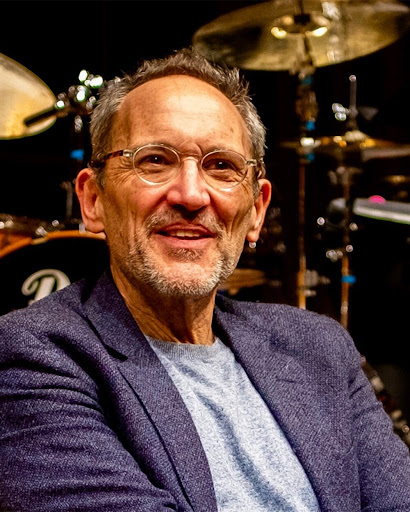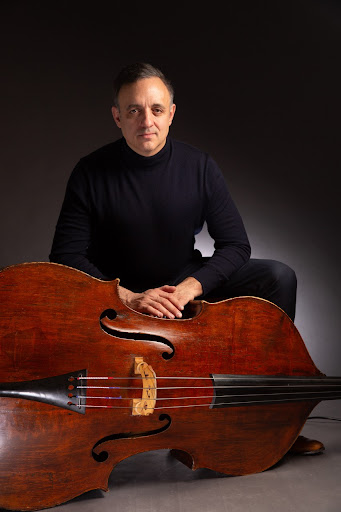by Jarrett Hoffman

Clarinetist Daniel Gilbert will be featured in “Explorations for Clarinet, Strings and Piano” (February 25), “The Visionary Clarinet” (March 16-19), and “Clarinet Dialogues” (May 13) — the outer two programs being chamber music collaborations, the middle one a solo appearance with the CityMusic Orchestra. Details of times and locations can be found here.
As is often the case with the best chamber music gatherings, family and friends play an important role here. The February program was put together by Gilbert and his wife, pianist Donna Lee, and it features a commissioned work titled Recitations and Dedications by a longtime friend of his: Gregg August (pictured below).
“I wanted to expand the repertoire for clarinet and strings,” Gilbert said during a recent telephone interview. “So I reached out to him and asked if he was willing to write a piece, knowing that it would be a crossover work.” As the clarinetist pointed out, August has a background that includes jazz, Latin jazz, and classical music. He’s a member of the American Composers Orchestra, Orchestra of St. Luke’s, and the JD Allen Trio, and has contributed his talents both as a player and as an arranger with Arturo O’Farrill’s Afro-Latin Jazz Orchestra.
“He wrote a really beautiful piece,” Gilbert said, pointing out the unique instrumentation: clarinet, piano, and string quartet — but with bass replacing cello. “He wanted to make it a little bit easier to go back and forth between jazz and classical.” As is always good news for composer, musicians, and listeners alike, the ensemble will record the piece the Sunday following the concert.
“Jim Stephenson we also know quite well,” Gilbert said, referring to the composer of Last Chants for clarinet, string trio, and piano, another work on the February program. “He wrote a piece for Liza Grossman, who ran the Contemporary Youth Orchestra. She commissioned a clarinet concerto for me, written by Jim — that was in 2010. He’s a wonderful composer, and his music is really accessible.”
Coincidentally, there are also ties between Donna Lee and two of the other composers on the program. As Gilbert explained, his wife was a teaching assistant at the Juilliard School when she was pursuing her master’s degree. “She ended up being the TA for a lot of young talent, and two of those people were Amanda Harberg and Kenji Bunch. They were doing ear training and theory their freshman year, and they’ve gone on to brilliant careers as composers.”
Fans of CityMusic may remember a piece by Harberg that appeared on last year’s concert series: Lucas’s Garden for clarinet, cello, violin, and piano. “We really fell in love with the sounds that she makes,” Gilbert said. “It’s really accessible music that has kind of a poppy feel to it.” The Sonata for Clarinet and Piano on this program has a similar feel, he said, adding, “It’s great clarinet writing.”
As for Kenji Bunch’s Drift: An Eventual Lullaby for clarinet, viola, and piano, its graphic score and its improvisatory nature were two aspects of the piece we discussed. “He has suggestions like ‘play a theme on these five notes,’ and then he tells the violist to mimic that theme,” Gilbert said. But an exact mimicking isn’t expected. As the composer writes in his program notes,
…melodies float around between the instruments, and develop through the inevitable ‘inaccuracies’ of memory and mis-hearings between the players.
“So that concert is going to be a lot of fun for the listeners,” Gilbert said. “There’s one world premiere and then repertoire that people probably don’t know.”
Conductors have not been a common sight at CityMusic events as of late. That’s both because of the prevalence of chamber music in the organization’s programming and because of an interest in going conductor-less, as they did during an orchestra program in October.
Sans conductor was the plan for the March program as well. “But the music is just so hard, we decided that we’d like somebody up there to keep it together.” That will be Joel Smirnoff, the violinist-conductor who also served as President of the Cleveland Institute of Music from 2008 to 2016.
The March program consists of Osvaldo Golijov’s The Dreams and Prayers of Isaac the Blind — often performed by clarinet and string quartet but here heard in a version for clarinet and string orchestra — paired with Beethoven’s “Kreutzer” Violin Sonata transcribed for strings.

About 800 years ago, Isaac the Blind — who was the greatest Kabbalist rabbi of Provence — dictated a manuscript saying that everything in the universe, all things and events, are products of combinations of the Hebrew alphabet’s letters. The Dreams and Prayers of Isaac the Blind is a kind of epic, a history of Judaism. It has Abraham, exile, and redemption. The movements sound like they are in three of the languages spoken in almost 6,000 years of Jewish history: the first is Aramaic; the second in Yiddish; and the third in Hebrew. I never wrote it with this idea in mind, and only understood it when the work was finished.
“It’s just like you’d imagine a dream to be — cacophonous and expressionistic,” Gilbert said, pointing out the work’s unique combination of influences, from Jewish to Argentine and contemporary classical. “You can’t help but be transported into a different world when you listen to it.”
In addition to its 40 minutes in length, the piece is difficult for its range — of pitch, of emotion, and of technique, particularly Klezmer technique. Gilbert noted that Golijov notates the work in a straightforward manner, “leaving it to the discretion of the soloist to play it in the style of Klezmer clarinet as much as possible.” Depending on the player, the end result can sound quite different from what’s written on the page.
Moving on to May, Gilbert said that the idea for “Clarinet Dialogues” came from CityMusic’s other clarinetist: Ellen Breakfield-Glick. “She called me and asked if I would like to do something with two clarinets and piano, and I said sure.” The program is still in progress — they’re looking to include pieces by Bohuslav Martinů, Michele Mangani, Francis Poulenc, and Felix Mendelssohn (the famous Konzertstück No. 2).
Gilbert also noted that right around this time of year, CityMusic musicians are in the process of sending ideas to executive director Eugenia Strauss for chamber music programs that might be put on the following season — a uniquely democratic process from this music director-less organization that leaves us looking forward, with piqued interest, to what is next to come.
Bottom photo by Yoni Golijov
Published on ClevelandClassical.com February 22, 2023.
Click here for a printable copy of this article




